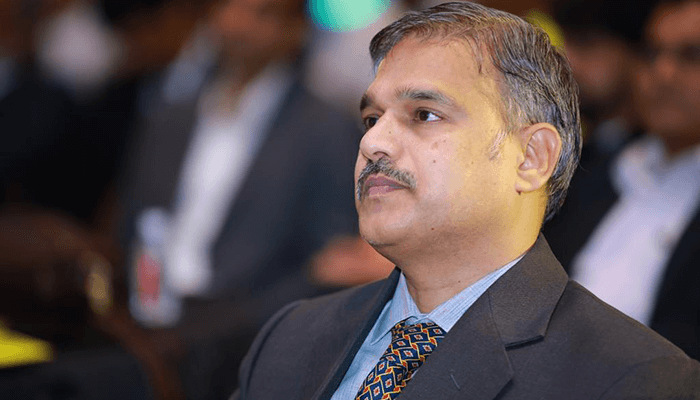An earthquake engineer’s formula for a good life may just be that cheat sheet that you missed in college. Prof. Ramancharla deconstructs the secret to sustainable happiness in a chaotic world. Here’s more on his Masterclass on smart living and his area of expertise- earthquakes and disaster mitigation.
“My core research work in earthquake engineering focuses primarily on safety of people and reduction in property loss”, observes IIITH Registrar Prof. Ramancharla Pradeep Kumar, who heads the Earthquake Engineering Research Centre, the only one of its kind in India.
His passion however, lies in strengthening the moral fiber of the individual via his now famous Human Values program. He is the coordinator for the Human Values Cell at IIIT Hyderabad.
Latur and Bhuj earthquakes have seismic tremors on the soul
“The 1993 Latur earthquake occurred when I was pursuing my B.E and the large fatality count shocked me”, recalls the Professor. His M. Tech in Structural Engineering (1997) from IIT Kanpur with specialization in random vibrations and earthquakes was a direct consequence of his efforts to make a difference in disaster mitigation.
“After my M. Tech, I had the opportunity to head West to follow the software dream or go to Japan, the mecca of hardcore earthquake engineering” said Prof. Ramancharla. He did a year’s stint as design engineer at L&T ECC, designing the sixth floor of Cyber Towers in the iconic HiTech City. He later joined the University of Tokyo for his Ph.D in earthquake engineering, on a Monbusho Fellowship.
The scholar was part of the 12-member team from Japan to study the 2001 Bhuj earthquake. His interactions with the victims convinced him to focus primarily on earthquake safety. Working at the University’s renowned Institute of Industrial Science, he met with several leading experts in the domain including his mentor Prof. Kimiro Meguro, Prof. Anil K Chopra, Ralf B Peck, Fumio Yamazaki and Prof. Steven L. Kramer.
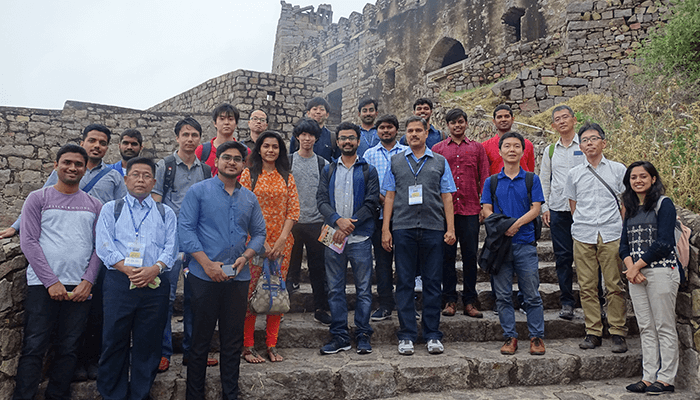
Joining IIITH was a happy accident
The freshly minted Ph.D had just wrapped up his post-doctoral work in 2002, when a casual introduction to IIITH Prof. Kamalakar Karlapalem in the University of Tokyo corridor landed him a faculty position in the recently established IIIT Hyderabad. Ramancharla got the ideal springboard to start the structural engineering program as well as establish the Earthquake Engineering Research Center at IIITH.
“It’s been an emotional journey for me”, said the Professor when quizzed about his IIITH experience. In the early days, he wore several hats, as faculty member in charge of Sports, Campus Security, PG Entrance exam coordinator along with Prof. P J Narayanan, Coordinator Convocation, new faculty orientation, etc. His flair for people management and administration made him the natural choice for Registrar in 2016.
A sought-after expert on Earthquake Engineering and Disaster mitigation
Prof. Ramancharla has a prodigious body of work in the domain and is a member of several expert committees on disaster mitigation including cyclones, urban floods, tsunami affected areas (2004) and Typhoon Hudhud (2014). As a member of Post-Earthquake Reconnaissance Team (PERT) of NDMA, GoI, he has investigated the destruction in Bhuj, Sumatra, Nepal and Sikkim earthquakes.
A member of several expert committees of NDMA, he participated in the preparation of National Disaster Management Policy and Guidelines for Earthquakes and Tsunamis. He also worked on the policy for restructuring of Fire and Emergency Services Department, Govt of Andhra Pradesh (united). He is currently a BIS panel member of IS 456 & IS 1343 (CED2), Earthquake Engineering Sectional Committee (CED39) and also a member of National Building Code of India (CED 46: P16).
“One of my notable contributions”, muses the Professor, “is how we do rapid visual survey for pre and post-earthquake assessment of buildings. We have generated a significant database of at least 80,000 buildings over a period of time. This along with ranking of cities on a scale of 1-100 are two national documents that are available”. Also, his most popular NPTEL course on structural dynamics has garnered nearly a million views online.
Ramancharla was recently honored with the “Outstanding Concrete Engineer of Telangana 2021” by the Indian Concrete Institute for his contribution to the field of concrete technology.
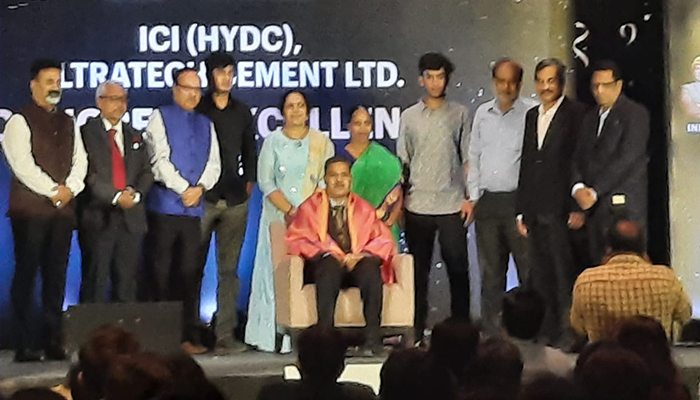
Early struggles of the high achiever
Early struggles caused by severe austerity as a youngster meant that Prof. Ramancharla appreciated the true value of both time and money. Growing up in the Dabirpura precinct of the Old City of Hyderabad as the third child of six siblings, there was little money but a treasure-trove of filial love and a hunger to break out of his circumstances. “We faced a lot of hardship and thus, from eighth class onwards, I started giving tuitions to cover my personal/educational expenses”.
The brilliant youngster voraciously read technical books and literature on philosophy, religion and metaphysics to understand the skewed world that he lived in. For sustainable happiness, one should be free from Bhoot kaal ki peeda, Bhavishya ki chinta aur vartamaan se virodh”. No regret of the past, no anxiety for the future and no opposition of the present.
Whatever be the challenge, it was Prof. Ramancharla’s patently unique system of tackling life that won him awards. Being a gifted student, he was the class topper through every rung of his illustrious educational career. His easy fluency in mathematics and engineering mechanics made him a popular student-tutor in Vasavi college and gave him financial independence.
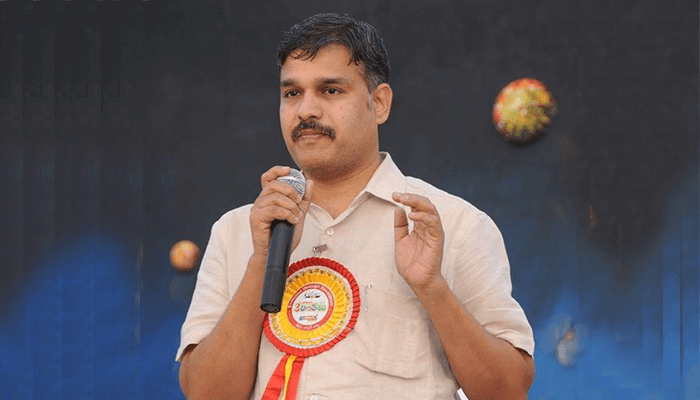
Kon’nichiwa from Tokyo and how the Human Values Cell began
While in Tokyo, Prof. Ramancharla realized that while Japan was technologically advanced, personal relationships were missing, compared to India. “I realized that the individual struggles with two problems; paucity of money-resources and lack of proper relationships. Our education system presently, is only able to solve the first problem and therein lies the issue”.
Prof. Ramancharla attended a workshop on human values in 2005, that would make a paradigm change in his professional career. “This was what I was searching for”, he recalls. He wrote the manual for the Introductory course on Human Values at IIIT Hyderabad, that he designed with Prof. Rajeev Sangal. His vision was influenced by Madhyasth Darshan, propounded by Shri Nagaraj of Jeevan Vidya. Says the professor, “The essence of human values education is rational, non-sectarian, universal and all-encompassing and that’s why we could introduce this course into academics “. Soon, requests started pouring in from colleges to deliver the content in Telugu. He would do a whirlwind 5-day workshop across 21 districts of Andhra Pradesh.
Ramancharla has conducted over 100 workshops, 300 guest lectures on value education, and was coordinator for a Vice Chancellors workshop and two International Conference on human rights in higher education.
A spinoff of the 2nd International Conference (2012) was that the Commissioner of collegiate education was motivated to introduce the course in 1,200 AP degree colleges. Parallel workshops for faculty members in 23 districts created 5,000 master trainers and the State-wide course was launched in August 2013.
FDPs on Universal Human Values caught the attention of AICTE. SIP has become a part of the Induction program nationally for engineering colleges with Prof. Ramancharla overseeing the process as the national coordination committee member for SIP.
For almost 2 decades, the professor has taught courses in structural dynamics, earthquake engineering and computer aided structural design. He has also taught UG courses in disaster management and engineering systems. He leads an active research group of Ph. D students and hopes to create an intellectual bank of hundred good quality Ph. D/ Masters’ professors who will inculcate the love of learning in students. He has published over 110 papers in national and international journals.
Oxygenating that agile brain with sports and music
“We were state cricket champions during my diploma days”, says the wicket-keeper who introduced cricket to the international student community in Tokyo. Among the many student-teacher cricket matches on campus, one exceptional batting partnership with Prof. Sangal earned him the nickname ‘Dhoni’.
When Ramancharla’s hectic travel schedule permits, he prefers to spend quality time at home with his wife Sarala Sree and sons – Ganesh and Dinesh. “I love film music and always carry my library of songs” says the Antakshari-expert who gives tough competition to his Masters’ and Ph.D students on their outbound tours.
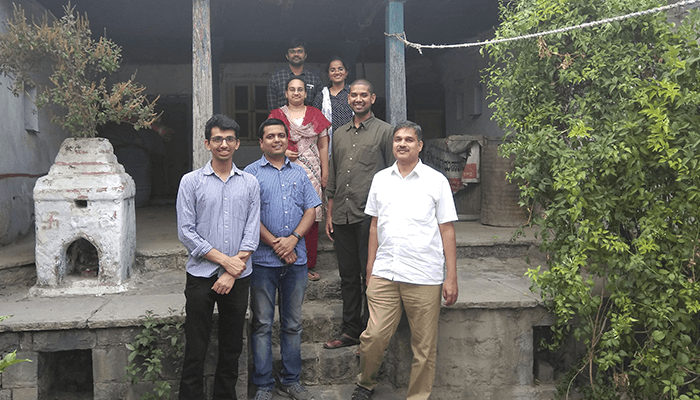
Are you a Plus or Minus kind of person in society?
“I believe that the work we do should benefit and enrich our surrounding environment”, reiterates the earthquake engineer. “Am I improving the space I occupy with my presence or not?” Good amenities lead to a comfortable lifestyle, but with meaningless acquisitions, you lose the essence of life.
“When we lost 16-17 of our people to Covid, the Institute reached out to help; counselling students and offering aid to the fraternity, with alumni-student initiatives like the Covid War room, that was put together overnight”, observes the disaster management strategist. “A quote painted on my school water tank had come true – ‘The end of all education is building up of character’. “By birth, a person is qualified as a human-being. But, only through education, he/she becomes competent as being-human”.

